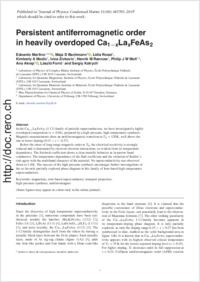Persistent antiferromagnetic order in heavily overdoped Ca1-x La x FeAs2
- Martino, Edoardo Laboratory of Physics of Complex Matter, Institute of Physics, École Polytechnique Fédérale de Lausanne (EPFL), Switzerland - Max Planck Institute for Chemical Physics of Solids, Dresden, Germany -
- Bachmann, Maja D Max Planck Institute for Chemical Physics of Solids, Dresden, Germany
- Rossi, Lidia Laboratory of Physics of Complex Matter, Institute of Physics, École Polytechnique Fédérale de Lausanne (EPFL), Switzerland
- Modic, Kimberly A Max Planck Institute for Chemical Physics of Solids, Dresden, Germany
- Zivkovic, Ivica Laboratory for Quantum Magnetism, Institute of Physics, Ecole Polytechnique Féderale de Lausanne (EPFL), Switzerland
- Rønnow, Henrik M Laboratory for Quantum Magnetism, Institute of Physics, Ecole Polytechnique Féderale de Lausanne (EPFL), Switzerland
- Moll, Philip J W Laboratory for Quantum Materials, Institute of Materials, École Polytechnique Fédérale de Lausanne (EPFL), Switzerland - Max Planck Institute for Chemical Physics of Solids, Dresden, Germany
- Akrap, Ana Department of Physics, University of Fribourg, Switzerland
- Forró, László Laboratory of Physics of Complex Matter, Institute of Physics, École Polytechnique Fédérale de Lausanne (EPFL), Switzerland
- Katrych, Sergiy Laboratory of Physics of Complex Matter, Institute of Physics, École Polytechnique Fédérale de Lausanne (EPFL), Switzerland
-
01.09.2019
Published in:
- Journal of Physics: Condensed Matter. - 2019, vol. 31, no. 48, p. 485705
English
In the Ca1−x La x FeAs2 (1 1 2) family of pnictide superconductors, we have investigated a highly overdoped composition (x = 0.56), prepared by a high-pressure, high-temperature synthesis. Magnetic measurements show an antiferromagnetic transition at T N = 120 K, well above the one at lower doping (0.15 < x < 0.27).Below the onset of long-range magnetic order at T N, the electrical resistivity is strongly reduced and is dominated by electron–electron interactions, as evident from its temperature dependence. The Seebeck coefficient shows a clear metallic behavior as in narrow band conductors. The temperature dependence of the Hall coefficient and the violation of Kohler's rule agree with the multiband character of the material. No superconductivity was observed down to 1.8 K. The success of the high-pressure synthesis encourages further investigations of the so far only partially explored phase diagram in this family of Iron-based high temperature superconductors.
- Faculty
- Faculté des sciences et de médecine
- Department
- Département de Physique
- Language
-
- English
- Classification
- Physics
- License
- License undefined
- Identifiers
-
- RERO DOC 327463
- DOI 10.1088/1361-648X/ab3b43
- Persistent URL
- https://folia.unifr.ch/unifr/documents/308295
Statistics
Document views: 97
File downloads:
- akr_pao.pdf: 117
